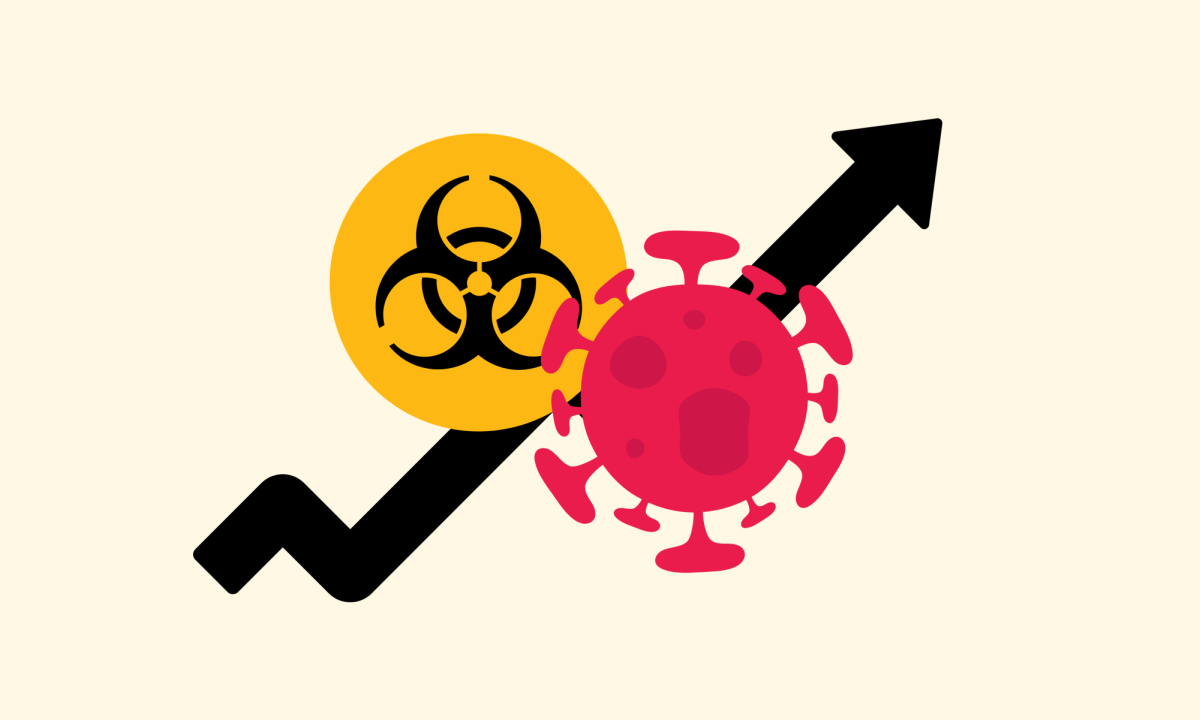The U.S. now has at least 600 measles cases reported in 21 states, including Pennsylvania, according to an April 4 update issued by the Centers for Disease Control and Prevention. About 481 of these cases have been reported in the South Plains and Panhandle areas of Texas, with a second measles-related death of an unvaccinated child reported by the Texas Department of State Health Services April 6.
According to CDC guidelines, the measles-mumps-rubella vaccination remains the most important tool for preventing measles, a highly contagious viral infection.
St. Joe’s Student Health Center Director Eileen Bevilacqua, RN wrote in an email to The Hawk that “the risk of contracting measles after vaccination is very low. Two doses of the MMR vaccine are 97% effective in preventing measles.”
St. Joe’s Immunization Policy states that students must submit their immunization records to the Student Health Portal in order to register for classes. Two doses of the MMR vaccine, given on or after the first birthday, and separated by at least one month, are required.
Bevilacqua said the Student Health Center is preparing for a possible case of measles on campus by preparing a list of students who have not provided documentation of receiving two doses of the MMR vaccine.
“These students may have waivers or exemptions for medical or religious reasons,” Bevilacqua said. “They will be contacted proactively to explain if a measles case is identified on campus, to provide education about exclusion requirements the school must enforce and to encourage vaccination.”
Preliminary data from the CDC indicates between one and nine measles cases in Pennsylvania, New Jersey, New York and New York State. The Philadelphia Department of Public Health confirmed a person had a case of measles in South Philadelphia in mid March, believed to have been contracted during international travel.
Julia Lee-Soety, Ph.D., associate professor of biology who teaches immunology and molecular genetics, said that measles is one of the most infectious diseases.
“It’s airborne, so if you walk into a room and somebody with measles had just been coughing, you could pick it up,” said Lee-Soety. “It’s more infectious than covid, more infectious than HIV, and also flu.”
Measles was declared eradicated in the U.S. in 2000, according to the CDC, meaning there was no continuous spread of the disease for over 12 months, even though cases and outbreaks still occur every year in the U.S. The majority of cases have been among people who are not vaccinated against measles.
According to 2024 data from the CDC, “vaccination coverage among U.S. kindergartners has decreased from 95.2% during the 2019-2020 school year to 92.7% in the 2023-2024 school year.”
Even though the MMR vaccine is very effective, undervaccination can still lead to outbreaks, said Shantanu Bhatt, Ph.D., professor of biology.
“[Vaccines] are really, really important tools in medicine to be able to fight off pathogens so that we don’t have these outbreaks and then they don’t graduate to epidemics or pandemics,” said Bhatt. “Many of the pandemics, or epidemics, that we’ve seen, quite a few of these have been because of outbreaks that started off in unvaccinated areas and then proliferated from there.”
Bhatt said vaccine hesitancy can be traced to false claims made by Dr. Andrew Wakefield in a 1998 article in the medical journal The Lancet. In the article, Wakefield and his co-authors falsely linked the MMR vaccine to autism spectrum disorder.
“The biggest problem, and we continue to experience that to this day, is that 1998 paper that was published by Andrew Wakefield, where he falsified data and linked the MMR vaccine to colitis,” said Bhatt. “That really decreased the vaccination rate, increased the occurrence of measles.”
Lee-Soety said Wakefield profited from his paper which was surrounded by ethical issues.
“It turned out to be a lie,” said Lee-Soety. “He put out that lie and still firmly believes it because he’s a snake oil salesman. He has monetary gains from propagating the lies.”
In 2011, the medical journal BMJ published a series of articles debunking the 1998 Wakefield article, which was later retracted by The Lancet, stating that “clear evidence of falsification of data should now close the door on this damaging vaccine scare.” Ten of Wakefiled’s co-authors eventually retracted their interpretation of the data for their study.
In Philadelphia county, about 97.5% of seventh-grade students and 97.1% of 12th-grade students have received at least two doses of the MMR vaccine, according to state data for the 2023-2024 school year.
The CDC recommends the first dose of the MMR vaccine for children at 12-15 months old, with a second dose typically given at ages 4-6 years old. Adults and teens should also be up to date on MMR vaccinations with either one or two doses (depending on risk factors), unless they have other presumptive evidence of immunity to measles, mumps and rubella. MMR vaccination is especially important for healthcare professionals, international travelers and other specific groups, according to the CDC.













































